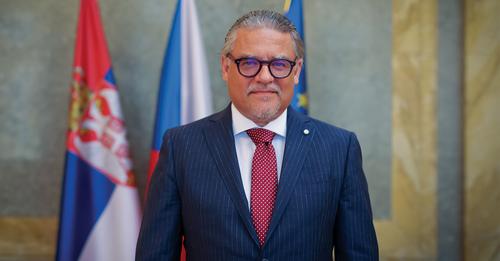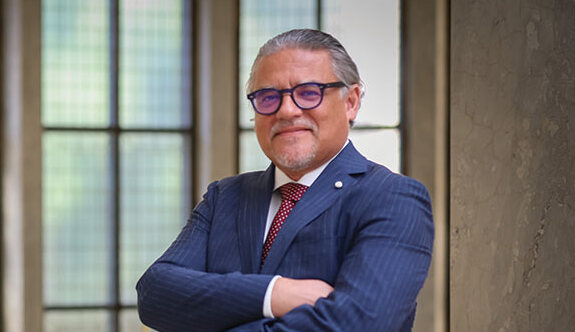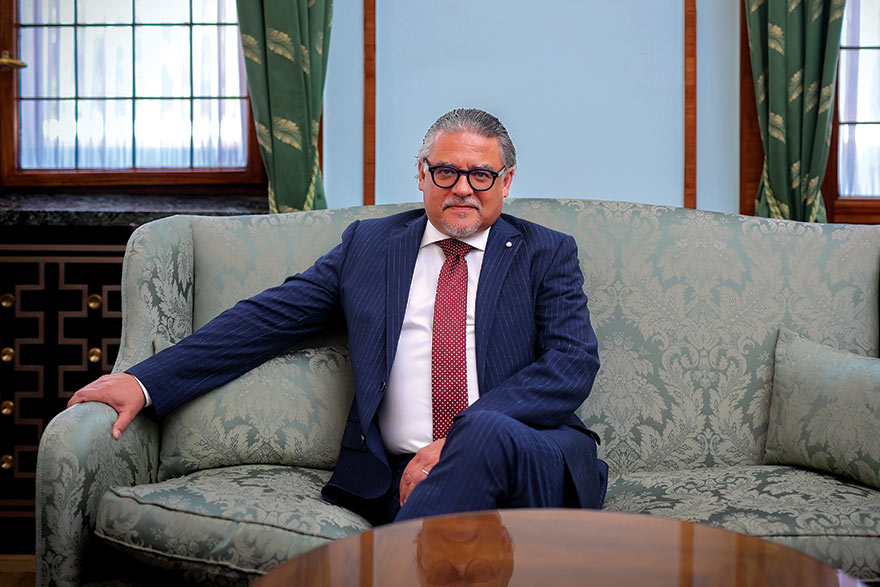
H.E. Tomáš Kuchta, Czech Ambassador To Serbia
7 јула, 2022Rethink, Rebuild, Repower
CORDMAGAZINE.COM,
ByLjubica Gojgić
The Czech EU Presidency will be ready to facilitate the Council of the EU’s discussion on the prospects of EU membership for Ukraine, while it will simultaneously support the EU integration of the Western Balkans ~ Tomáš Kuchta
he priority of the Czech EU Presidency, which began on 1st July, will be the strategic strengthening of the EU and its defensive capabilities, says Ambassador Tomáš Kuchta for CorD Magazine. At the same time, he notes, ensuring energy stability, strengthening democratic institutions and supporting Ukraine remain in focus. The Czech Republic will strive to strengthen its ties with “liked-minded countries” in the regions of the Western Balkans, Eastern Europe, Indo-Pacific and the Sahel.
Your Excellency, the Czech Republic took over the rotating presidency of the Council of the European Union as of 1st July. Could you tell us what the priorities will be over the next six months?
The invasion of Ukraine by the Russian Federation has completely overhauled the geopolitical situation on our continent, while demonstrating that the European Union is able to respond decisively. The events of the last weeks and months have shown, perhaps to the surprise of many external observers, that Europeans in a crisis triggered by an external threat are able to act very quickly, effectively and in a united way.
Our culture of political dialogue and consensusbuilding, that we have been forging for decades, proves to be a strength rather than a weakness of the European project. At the same time, European unity is not one of authoritarian unanimity, rather unity in the diversity of a multi-voice debate, which is still driven by our common values, towards consensus.
Nevertheless, the brutal war being waged beyond the eastern borders of our community has also clearly shown us that we will have to find the courage to rethink and reevaluate many of our current approaches. We therefore perceive the slogan “Europe as a task: rethink, rebuild, repower”, chosen as the motto of the Czech Presidency of the Council of the EU in 2022, not only as an opportunity to reflect together, but above all as a call for accountability and determined action based on the values that our conscience requires us to pursue.
We believe that, in the current situation, a common reflection on European tasks must find the right recipe as quickly as possible, in the form of a policy mix that will ensure security and peace on our continent, and lead the EU towards reaching the long-term goals of the green and digital transitions, while at the same time making it possible to deal effectively with the present security, energy and humanitarian crisis, as well as with acute economic and social challenges that are partly due to the Covid-19 pandemic and have been exacerbated by Russia’s aggression.
“ We perceive the slogan “Europe as a task: rethink, rebuild, repower”, chosen as the motto of the Czech Presidency of the Council of the EU in 2022, not only as an opportunity to reflect together, but above all as a call for accountability and determined action based on the values that our conscience requires us to pursue „
The overall objective of the Czech Presidency is to contribute as much as possible to creating the required conditions for the security and prosperity of the EU, in the context of the European values of freedom, social justice, democracy and the rule of law and environmental responsibility. The EU must focus on ensuring security, together with NATO, and ensuring the strategic resilience and competitiveness of the European economy. The EU, together with the United States and other democratic states outside the EU, should become a strong foundation for a strategic community defending fundamental values, human rights, a free way of life and liberal democracy. In order to achieve this objective, the Czech Republic has set the following political priorities for its Presidency of the Council of the EU:
1. Managing the refugee crisis and Ukraine’s post-war recovery; 2. Energy security; 3. Strengthening Europe’s defensive capabilities, including cyberspace security; 4. Strategic resilience of the European economy; 5. Resilience of democratic institutions.
As far as geographical priorities are concerned, deepening the transatlantic partnership and strengthening relations with other like-minded countries, Ukraine and Eastern Europe, the Western Balkans, the Indo-Pacific and the Sahel will be in the focus of the Czech Presidency.
Do you believe that the EU can quickly find alternatives sources of energy, which is proving to be the worst economic consequence of the war in Ukraine?
The EU cannot be crucially dependent on countries that directly threaten its security, and must therefore break its dependence on Russian gas, oil and coal. Finding alternative sources of energy will be a long and very complicated process. The Czech Presidency will place an emphasis on the EU’s energy security issues, which are currently more pressing than energy transition, and on the accelerated implementation of REPowerEU, an important part of which is diversification of sources, including logistics, energy savings and acceleration of the transition to low-emission and renewable energy sources. The Czech Presidency is ready to work on the implementation of the regulation of gas reserves, i.e., filling storage facilities in the runup to winter, and on the promotion of voluntary joint purchases, so that the EU uses its weight in a similar way to the way it did on the procurement of vaccines.

The crisis in Ukraine has also brought the issue of EU enlargement to the fore. While some are advocating for the accelerating of the process of integrating the Western Balkan nations into the EU, we’ve seen the emergence of a thesis, championed by the French president, whereby inclusion in a kind of “European political community” is the most non-EU member states can hope for. Which theory do you prefer?
I would not agree with the view regarding the “European political community”. In my opinion, it is very important, but on the other hand only one of a number of political concepts (see, for example, an Austrian non-paper submitted to Serbian authorities during the recent visit of Foreign Minister Alexander Schallenberg) aimed at accelerating the enlargement process and making it more transparent, tangible and comprehensible for the populations of candidate countries.
As for Ukraine, I can only confirm that the Czech EU Presidency will be ready to facilitate the Council’s discussion on the prospects of its EU membership. Simultaneously, it will support the EU integration of the Western Balkans. We will also deal with the security, economic and social impact on this region of the Russian aggression against Ukraine.
The war in Ukraine has created new turbulence in Europe, but even in this new difficult situation Czechia is determined to work on promoting the EU enlargement policy. The Western Balkans and EU enlargement will be at the top of our priorities.
Besides supporting the EU enlargement process, the Czech Presidency will look for ways to expand and deepen cooperation between the EU and the Western Balkans in various fields, with the aim of facilitating the region’s future integration into the EU. We want to focus mainly on security, regional economic cooperation, connectivity, energy security, post-Covid-19 recovery, the green agenda or civil society cooperation.
We would also like to bring the issue of reconciliation to the attention of our Western Balkan partners. Unfortunately, the current lack of progress in coming to terms with the past has a negative impact on efforts to maintain good neighbourly relations, develop more effective regional cooperation, and ultimately become part of the EU family.
Serbia condemned Russia’s attack on Ukraine, supported the UN’s resolution and participated in a donor conference to raise funds to help the endangered population. However, according to President Aleksandar Vučić, Serbia is still under great pressure to join the economic sanctions against Russia, despite not being an EU member state. Do you consider such a demand as being justified?
As all we know, the alignment of candidate countries with the Common Foreign and Security Policy is one of the key determining factors for EU accession. The importance of this alignment rose sharply after Russia attacked Ukraine in February. Although Serbia’s decision to join the EU sanctions against Viktor Janukovič and Belarus are considered a step in the right direction, at the moment Serbia’s CFSP alignment stands below 50%. Imposing sanctions on Russia would be viewed, at any rate, as confirmation of the foreign-political determination of Serbia to join the Western community and its values.
“ The war in Ukraine has created new turbulence in Europe, but even in this new difficult situation Czechia is determined to work on promoting the EU enlargement policy. The Western Balkans and EU enlargement will be at the top of our priorities „
It goes without saying that, due to many reasons, it is not easy for Serbia to decide on harmonising with the sanctions imposed by the EU against Russia. On the other hand, one must always consider all the pros and cons thoroughly.
Given your previous experience as a deputy defence minister of the Czech Republic, how do you view the renewed arming of Western Balkan countries? Is it a necessity dictated by the times in which we’re living or a cause of concern?
Each state has a duty to guarantee its citizens security. Each country has the right to enhance security and defence capacities, and to cooperate with its allies in order to prevent any kind of danger.
What could you say about the level of military cooperation between Czechia and Serbia, considering that our two countries have a signed bilateral agreement in this field?
Given growing global instability, the development of long-term cooperation on strategic military systems is essential. In addition to ensuring the necessary capacities, including supporting capacities based on existing technologies, Czechia pays attention to cooperation and investment in reducing technological dependence, in particular with regard to new and disruptive technologies, and to ensuring the resilience of critical value chains needed for these technologies. Cooperation with Serbia in this field could be very interesting, but for the moment we are at the very beginning.
As someone who’s spent almost four years in Serbia, during a period that’s been marked by bilateral visits at the highest level, what do you consider as your biggest challenge until the end of your ambassadorship in Belgrade? Is there something you haven’t yet managed to do?
You are right, after four years I can see many positive and concrete results in the field of bilateral relations between our two countries. There are some challenges for the next twelve months, but I do not want to reveal more for the moment.
You’ve said that businesspeople from Czechia are interested in investing in Serbia, which some of them viewed – at least prior to the outbreak of the Ukraine crisis – as the first country that would be next to join the EU. It was also noted that the first investment to be signed in Serbia following the lifting of the state of emergency, linked to the Covid-19 pandemic, was an investment from the Czech Republic. How are works progressing on the construction of Czech company SPEL’s factory for the production of cables in Bela Crkva?
As far as I know, the Covid-19 pandemic and the situation in Ukraine delayed SPEL’s investment in Bela Crkva. In contrast, the investment of IMG in Vršac is proceeding very well and the construction of a production facility is following the time schedule.
A Czech investment fund has taken over mobile operator Telenor, while Czech company Mattoni owns the Knjaz Miloš water factory – both of which represent recognisable acquisitions in the Serbian economy. Where do you see room for new investments?
Definitely in real estate development, IT, wastewater management technologies, agriculture and food processing.
It is a matter of historical record that Czech people have spent centuries relocating to the territory of today’s Serbia, and that they mostly reside in Vojvodina and Belgrade, though you recently also had an opportunity to hear about the Czech minority in the town of Ćuprija. Are you satisfied with the way the Czech community is treated in Serbia?
I am very much satisfied with the way the Czech community is treated in Serbia. I would like to thank the Serbian government and the public administration for the way they treat the Czech minority. Not every country in the world demonstrates such a generous behaviour towards minorities.
Following two years of lockdowns around the whole world, the situation is now slowly returning to normal. Are we seeing a resumption of the practise of granting scholarships to study at universities in the Czech Republic, which has always been met with great interest in Serbia, and brought particular fame to the renowned Prague Film School?
The Prague Film School is one of Europe’s leading schools providing training in the core disciplines of filmmaking. The school’s accelerated programmes, international faculty and world-class facilities draw applicants from all over the globe who are determined to convert their passion for film into a profession. For those who would like to apply to study during this year, the application deadline is 25th July, 2022.

However, studying in Czechia doesn’t only relate to Prague film school. Boasting the oldest university in Central Europe, founded in 1348, whose faculty a century ago included Albert Einstein, Czechia offers an attractive environment to international students, with a wide and expanding variety of undergraduate and graduate programmes.
The living standard in Czechia is quite high, while the cost of living remains reasonable. The same can be said about higher education: students get a high-quality education and pay affordable tuition fees. Besides, study programmes in the Czech language at public universities are free of charge!
„ I would like to thank the Serbian government and the public administration for the way they treat the Czech minority. Not every country in the world demonstrates such a generous behaviour towards minorities „
Comprehensive and well-structured information for prospective foreign students can be found at www. studyin.cz. This website provides advice on the Czech education system, higher education institutions and their courses and scholarships, together with a basic guide to living in Czechia. Specific information on particular universities and their programmes is accessible via links to their websites.
It is always advisable to contact a university directly with enquiries about their courses, admission requirements or availability of scholarships. Some Czech higher education institutions grant scholarships for excellent study results or administer other types of scholarships.
Other options include, for example, utilising supporting study programmes like the Erasmus Mundus Programme of the European Union, CEPUS; scholarships provided by the Visegrad Fund and others that offer scholarships for highly qualified students and scholars to follow a selected Masters or Doctoral course or to carry out teaching and research assignments within the course



